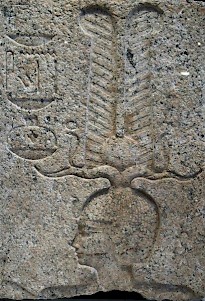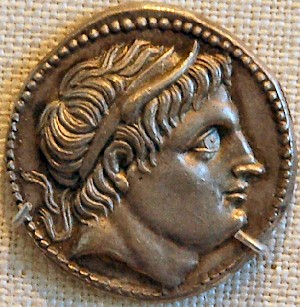Macedonia (7)
Q83958Macedonia: ancient landscape and state, situated in the Former Yugoslav Republic of Macedonia and northern Greece, best known because its king Alexander the Great (r.336-323) conquered the Persian Empire and inaugurated a new period in Greek history.
After Alexander
When Alexander the Great had left Macedonia to conquer the Achaemenid Empire, he had appointed Antipater as his viceroy. This officer remained supreme commander of the Macedonian forces in Europe after the death of the king (11 June 323), even though a courtier named Perdiccas became regent of the new ruler of the Macedonian empire, Alexander's half-brother Philip III Arridaeus, who was mentally unfit to rule.
Perdiccas' regency was short-lived. One of Alexander's generals, Ptolemy, had become satrap of Egypt and ignored Arridaeus and Philip. And when the two last-mentioned decided to restore order in the south-west of the empire that Alexander had acquitted, Perdiccas was assassinated by his own officers, somewhere on the banks of the river Nile. After this event, it was almost certain that the Macedonian empire would fall into pieces. Antipater, who was in the position to negotiate a deal between the rival factions (the Triparadisus settlement), accepted the regency and took the royal family with him to Europe. He left Antigonus Monophthalmus in charge of the Macedonian forces in Asia.

The story of the next twenty years is very complex (for the details, go here). For our purposes, it is sufficient to know that Antipater died soon after his return to Europe (probably in the autumn of 319; text), and that he left the Macedonian royal family in the hands of an officer named Polyperchon. Although he was the new regent, he was no match for Cassander, a son of Antipater who claimed and obtained his father's position as de facto ruler of Macedonia and the Greek world. During his coup, king Philip Arridaeus was killed (text), leaving Alexander IV, the son of Alexander the Great, as only surviving member of the Argead dynasty. The boy was killed soon afterwards (text).
Macedonia was exhausted after the Persian war, and compared to the other successors of Alexander, Cassander refrained from war as much as possible. One of his successes was gaining control of Athens, where he disbanded the democracy and appointed Demetrius of Phaleron (a student of Aristotle of Stagira) as governor. Other towns were garrisoned. This may have stabilized the region. Cassander also did his best to improve the economy, and founded important cities like Cassandria (formerly known as Potideia) and Thessaloniki, which he named after his wife, a sister of Alexander the Great.
Things took a turn for the worse when the son of Antigonus, Demetrius, liberated Athens (307; text). Cassander rapidly lost control of Greece, and at one point was even confronted with an invasion from the south. The armies of Demetrius and Cassander faced each other for some time in 302, but it soon became apparent that another war zone, Anatolia, was more important. Demetrius joined his father at Ipsus in Phrygia, and Cassander sent troops to Lysimachus, the ruler of Thrace, who had invaded Anatolia. Another general, Seleucus, appeared on the scene too, and in 301, Antigonus and Demetrius were defeated. The result was that Asia was to be divided between Seleucus and Ptolemy of Egypt.

For a while, Cassander's control of Macedonia seemed secure, but he was unable to recover Greece. In 298, he died. Only a few people mourned the man who had massacred the Macedonian royal house and garrisoned Greece. There was confusion about the succession, and Demetrius was able to get himself recognized him as king (294; text).
For six years, he controlled Macedonia and a large part of Greece, but then, his subjects revolted. It is not known why, but it is tempting to suppose that they were shocked by Demetrius' forced conscription, which must have been a disappointment after the quiet last years of Cassander. Demetrius now installed his son Antigonus Gonatas as governor of Greece, and decided to launch an all-out attack on the east. If he could defeat Seleucus, he could reach the eastern parts of the known world, gather troops, and return with a large force. It was a gamble, and few will have been surprised by its failure (285).
The next years were chaotic. Lysimachus of Thrace and king Pyrrhus of Epirus tried to intervene, an adventurer named Ptolemy Keraunos was able to seize power, but was defeated when the Galatians - a Celtic tribe - invaded Thrace, Macedonia, and Greece. In the end, Antigonus Gonatas, the son of Demetrius, seized power in Macedonia and founded a new dynasty.
| Demetrius I Poliorcetes |
294-288
|
| Antigonus II Gonatas |
283-239
|
| Demetrius II |
239-229
|
| Antigonus III Doson |
229-221
|
| Philip V |
221-179
|
| Perseus |
179-168
|
The great wars were now over, but peace was a rare thing in the ancient world. Antigonus Gonatas had to defend himself against Pyrrhus (who was killed in action in 272) and was faced by a large insurrection in Greece. During this Chremonidian War, Athens and Sparta, supported by king Ptolemy II Philadelphus of Egypt, tried to expel the Macedonians, but in the end, Antigonus kept what he had. However, the Greeks had learned that they had to create federations of city states to defend themselves with more success. The Achaean and Aetolian leagues were to become important factors during the next decades.
After the reign of Demetrius II (r.239-229), Antigonus III Doson became king. During his reign, the Spartan king Cleomenes III tried to restore his city's fortunes, and the people of the towns in the Achaean League felt threatened. They invited Antigonus to rescue them. At Sellasia, north of Sparta, Cleomenes was defeated. Sparta was occupied, Arcadia became part of Antigonus' possessions, and when the king died, Macedonia resembled a superpower again.